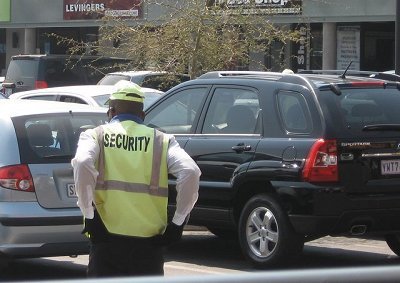Mexico's Parking Predators

Often the only option is to pay the attendants, known as "franeleros" for the rags or "franelas" they use to signal cars in and out of parking spaces they have commandeered. Not paying could mean returning to a broken windshield wiper, a long key scratch along a door or, in extreme cases, a smashed window.
Parking bullies
Here and in other well-to-do areas of traffic-choked Mexico City, authorities are trying to take back the streets by installing parking meters. They say the meters will make the area safer and more orderly, as well as encouraging less driving, which will be a boon for a polluted city with more than four million cars.
Residents of Condesa, a bohemian neighborhood of 70000 residents who rub shoulders every day with 170000 visitors, will decide in a referendum Sunday whether they want the meters on their streets.
Many are vehemently opposed, hanging banners from balconies to attack meters, saying the streets are public and no one should profit from them.
Others hope the plan will cut down on cars from elsewhere. Parking has become so critical that some Condesa residents have seized their own pieces of the street by erecting removable metal bars that jut from curbs in front of their homes.
Alternatives
Another option is to leave car and keys with valet parking attendants, who also block spaces for their clients.
Resident Elizabeth Ramos (39), who said she plans to vote "yes" on meters, commented: "There are times when you drive and drive around and when you finally find a parking spot along comes a man to charge you for it. It really makes me mad."
One reason the meters help chase off franeleros is that EcoParq, the company operating the machines, has a financial incentive to summon police when anyone tries to block off a parking space without paying.
Prior to the arrival of meters in Polanco, franeleros charged Rs49 to Rs97 for a day of parking. Current meter fees are Rs17 an hour, or about Rs153 a day, a sum that adds up for those who work in the area. For residents without their own parking spots, the city will issue one permit per home exempting a single car from paying the meter fee.
Officials also play up security in pushing the parking meters.
Lookouts?
Posters plastered throughout Condesa warn that franeleros could be used by criminals because they spend entire days on the same streets, learning the habits of residents.
Maria Antonieta Cendejas (67) who owns a convenience store in Condesa near Parque Mexico, where franeleros have taken over her street, said: "They can be very aggressive and that's always uncomfortable. I used to remove their buckets but then they started placing concrete blocks and I couldn't move them."
Opponents of meters say authorities should focus on better planning and stop allowing restaurants, bars and office buildings that don't provide parking.
Antonia Romero (67), who has lived by Parque Mexico for 35 years said: "The main problem is not the franeleros but all the businesses that have opened up and have no parking.
"We used to have parking lots, but they have been replaced them with apartment buildings."
Luis Hernandez used to earn a living by selling candy and potato chips at a street stand near Condesa, but he said officials closed it down because he didn't have a permit. So he began working as a franelero along Parque Mexico.
Hernadez said: "The government will leave a lot of people without anything to eat. I'm really mad about all of this because all we want to do is work."
Related News


